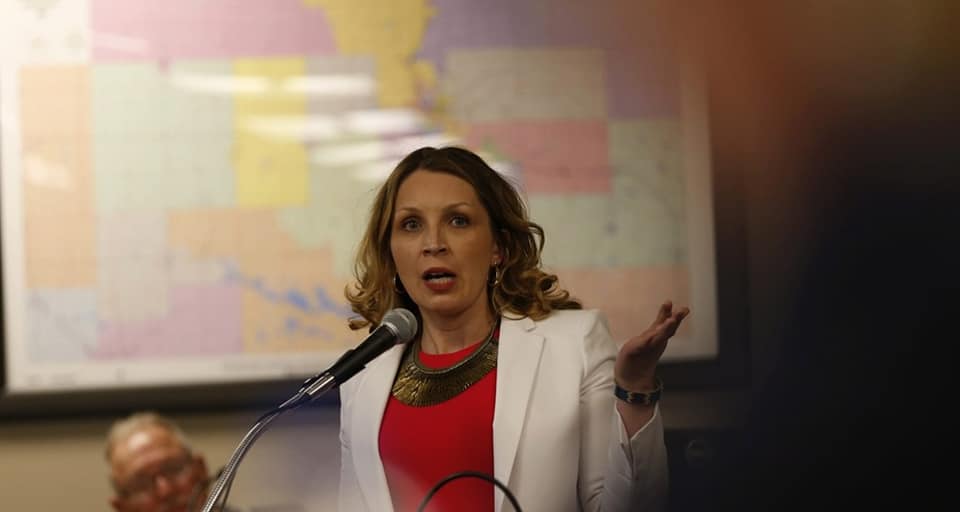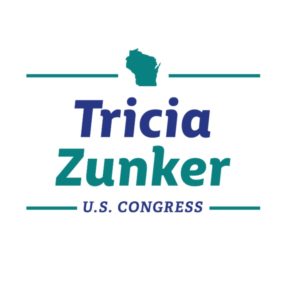
- Details
- By Levi Rickert
WAUSAU, Wisc. — Next Tuesday, May 12, voters will go to the polls to vote in a special election in Wisconsin’s 7th congressional district. The election’s result could produce another American Indian woman in Congress because the Democratic Party’s nominee, Tricia Zunker, is a tribal citizen of the Ho-Chunk Nation.
The special election was necessitated because the congressional seat was vacated by Rep. Sean Duffy (R-Wisconsin). Duffy retired last September to spend more time with his family.
Zunker, who is an associate justice on the Ho-Chunk Nation’s Supreme Court and current president of the Wausau Public School Board, has proven to be a formidable candidate. She handily won the primary election, taking 89 percent of the vote.
The COVID-19 pandemic has added a different twist to Zunker’s campaigning. She stopped holding in-person campaign events and went virtual utilizing ZOOM meetings and making phone calls.
Zunker has been endorsed by Sen. Tammy Baldwin, Sen. Elizabeth Warren, Sen. Kamala Harris, Rep. Deb Haaland, Rep. Sharice Davids, former Rep. Dave Obey, EMILY’s list, and more.
Zunker answered the following questions for Native News Online on Friday:
Given the COVID-19 pandemic, tell us how voters in the 7th Congressional district will be voting next week? Only mail-in?
When this pandemic started, my campaign urged for Wisconsin to switch to mail-in voting so that everyone could safely vote. That did not happen, so we've encouraged people to request absentee ballots. Many people are unable to, however because of a lack of access to the internet to request an absentee ballot or difficulty taking the requisite photo of their ID, so we're encouraging anyone voting in person to wear a mask and practice safe social distancing by staying at least stay six feet away from others.
After campaigning for this congressional seat, what do you think voters in the district want from the representative in Congress?
 I think people in this district want someone who will put partisan politics aside and work to get things done. They want someone who will advocate for affordable health care, for help for our small businesses and family farmers, and to protect our environment. I am committed to working across the aisle to achieve bipartisan solutions that make life better for everyone here in Wisconsin.
I think people in this district want someone who will put partisan politics aside and work to get things done. They want someone who will advocate for affordable health care, for help for our small businesses and family farmers, and to protect our environment. I am committed to working across the aisle to achieve bipartisan solutions that make life better for everyone here in Wisconsin.
Is your campaign still raising funds?
We're working hard through election day to raise the funds needed to get the message out to every voter in this 26 county district. This is a grassroots campaign and contributions can be made at: https://secure.actblue.com/donate/tricia-website
Has there been polling done for the special election? If so, what are the results?
Given how unpredictable turnout is for a special election during a pandemic, we've focused our resources on reaching out to voters.
Going into the last weekend prior to the election, how are you feeling about your chances for victory?
I'm really excited about the momentum and enthusiasm we've been seeing throughout this district, and I'm looking forward to historic results on election day.
RELATED: Tricia Zunker (Ho-Chunk) Seeking to Become Third American Indian Woman Elected to Congress
More Stories Like This
Native News Weekly (August 25, 2024): D.C. BriefsUS Presidents in Their Own Words Concerning American Indians
Native News Weekly (December 14, 2025): D.C. Briefs
Wounded Knee Massacre Site Protection Bill Passes Congress
Two Murdered on Colville Indian Reservation
Help us defend tribal sovereignty.
At Native News Online, our mission is rooted in telling the stories that strengthen sovereignty and uplift Indigenous voices — not just at year’s end, but every single day.
Because of your generosity last year, we were able to keep our reporters on the ground in tribal communities, at national gatherings and in the halls of Congress — covering the issues that matter most to Indian Country: sovereignty, culture, education, health and economic opportunity.
That support sustained us through a tough year in 2025. Now, as we look to the year ahead, we need your help right now to ensure warrior journalism remains strong — reporting that defends tribal sovereignty, amplifies Native truth, and holds power accountable.
 The stakes couldn't be higher. Your support keeps Native voices heard, Native stories told and Native sovereignty defended.
The stakes couldn't be higher. Your support keeps Native voices heard, Native stories told and Native sovereignty defended.
Stand with Warrior Journalism today.
Levi Rickert (Potawatomi), Editor & Publisher

